What Ruined Edgerunners for Me
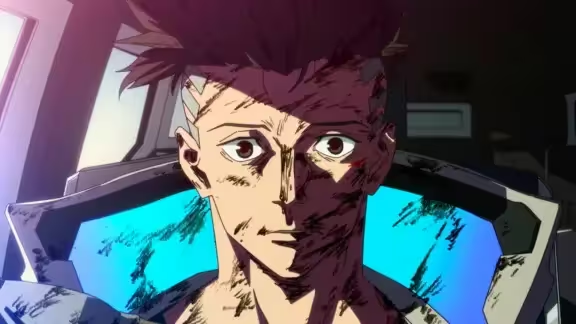
I was pretty excited for Cyberpunk: Edgerunners when I first saw the trailer on YouTube. Really, the excitement came from seeing Studio Trigger involved (as someone who enjoyed KILL la KILL) in the gritty setting of the Cyberpunk universe. Unfortunately, I’ve never played the game yet so take that in mind as you read this. I did not get to watch it on day one either, and I only saw it a couple weeks later after a friend insisted me to.
Also, if it isn’t clear yet, this article will have major spoilers.
Appreciating the Cyberpunk Setting
Let’s first acknowledge the biggest advantage of Edgerunners: the cyberpunk setting. I’m not limiting this to the Cyberpunk universe that Mike Pondsmith created but the general notion of cyberpunk as “lowlife and high tech”. We see this same notion in other anime such as Akira (1988), Ghost in the Shell (1995), Cowboy Bebop (1998), Serial Experiments Lain (1998), Texhnolyze (2003), and more recently, Akudama Drive (2020). Simply, it deals with “lowlife” people (such as criminals, the working class, the mentally troubled, the alienated youth, etc) struggling in a highly technological capitalist or fascist society.
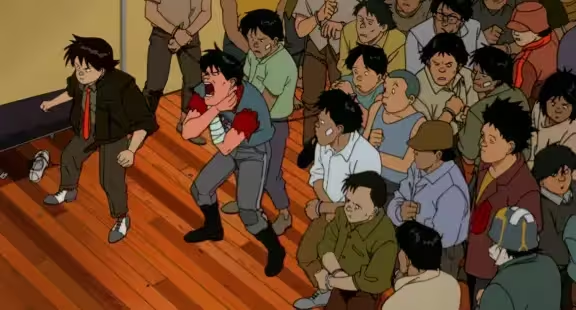
Edgerunners features David Martinez, a smart low class Latin American university student. He rejects the corporate life – opposing the will of his working class mother who is hospitalized after being caught in a violent highway robbery. She dies and the hospital claims they couldn’t do anything to save her. David is left with no family, no money, and no home. His only possessions are his mother’s jacket, his mother’s cremated remains, and the Sandevistan she illegally salvaged.
This premise sets up a lot of what makes the cyberpunk genre significant today. First, cyberpunk can’t be cyberpunk without a dystopia. Edgerunners is filled with imagery of a dystopic society: high crime rate, dysfunctional citizens, late capitalism and hyper-consumerism, large scale monopolizing corporations, terrible healthcare systems, and filthy landscapes. Second, we must peek into lowlife. We see David struggle in university because of his social status: he is bullied and he cannot afford learning materials nor a clean uniform. The university doesn’t really try to help him, and instead tries to get rid of him.
What’s more interesting is how David is Latin American. The web series attempts to take a character from a Third World region to reflect the real world issues of neocolonialism and capitalism.
There is also the technology and trends around the characters that are seemingly familiar in the real world today: virtual reality, pornography and sex toys, X-as-a-service, commodification of everything, advanced surveillance systems, and paid software updates.
When we compare Edgerunners to cyberpunk anime of the 80s and 90s, we can definitely see how much closer Edgerunners’ dystopia is to the real world. Edgerunners’ setting has advanced the cyberpunk genre to be more horrifying by portraying this dystopia to be only one step away from our current condition.
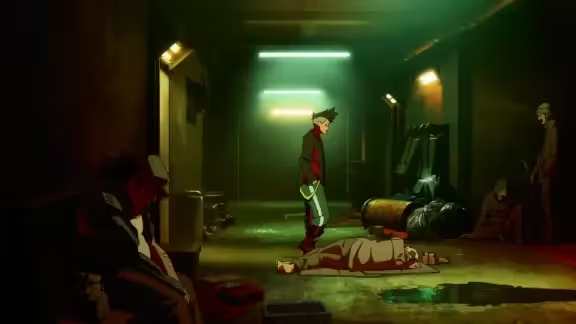
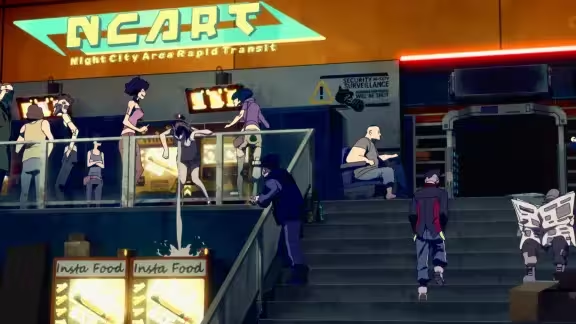
All of these immediately set up Edgerunners to be a work of truth. Despite the colorful aesthetic of the series, it still criticizes late capitalism by portraying their atrocious effects (particularly on death, injustice, and alienation) on the people. With the setting and premise in place, we expect to see a response through its narrative – one that is also critical if we want it to advance the cyberpunk genre out of merely “predicting” or portraying a dystopia.
Where It Struggles
By the end of episode six, nearly half of the crew dies – mostly as a result of cyberpsychosis. Pilar is killed by a cyberpsycho and Dorio is killed by the cyberpsychotic Maine who commits suicide. Edgerunners, like other cyberpunk anime (especially Akira and Texhnolyze), also criticizes transhumanism by exploring one’s loss of human agency. In our case, David is reduced to being a mere tool and he admits that to himself and Lucy.
There’s nothing wrong with criticizing transhumanism but if you throw out the other themes of the series just to focus on transhumanism for the rest of the show’s running time, then it becomes frustrating when we consider that most people are concerned with late capitalism – especially people like David who first-hand experiences its effects.
This isn’t nitpicking against Edgerunners’ criticism on transhumanism either. The show also doesn’t respond to transhumanism properly just like how it doesn’t respond to late capitalism.
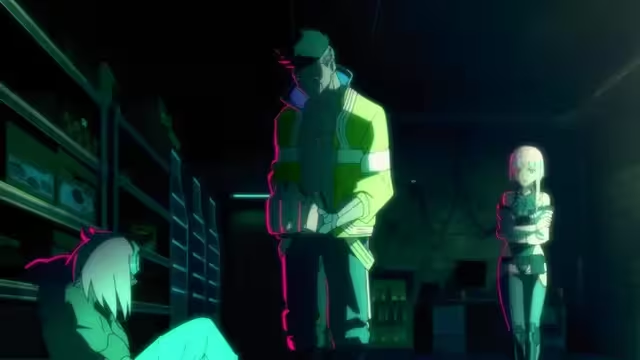
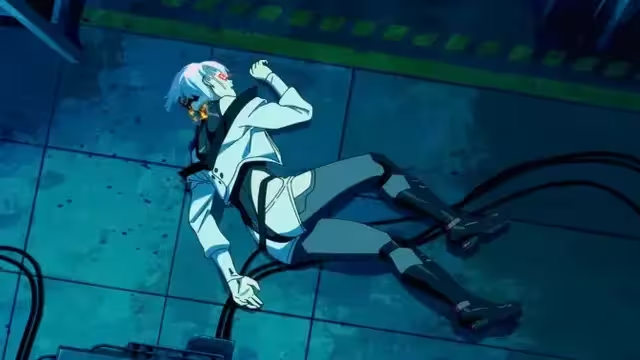
From episode seven onward, the crew’s problems revolve around David’s unbelievable tolerance to cyberpsychosis. Lucy refuses to rejoin the crew so she could prevent data on David’s potential to be the next Adam Smasher-like weapon from reaching Arasaka (or any corporation for that matter). Faraday and Kiwi (who now betrays the crew) capture Lucy and the rest of the show is about David saving Lucy while he struggles with cyberpsychosis.
The crew begin to fight their way through Arasaka forces but this fight isn’t entirely intentional. It isn’t a realized cause to resist corporations. It only comes as an afterthought or an unintended consequence of Lucy’s capture. The anime’s criticism on late capitalism ends through the following dialogue:
David: “Look, Mom. I’m here at the top of the Arasaka tower.”
Ripperdoc (flashback): “Once you’ve gone off the edge, there’s no coming back. Doesn’t matter how special you are.”
David: “But that’s why I’ve gotta go. ’Cause I’ve got nothing left now.”
David decides that his end goal (or one of) is his mother’s wish despite initially rejecting the corporate life. Of course, this isn’t entirely true as he’s nearly cyberpsychotic at this point. While he’s not actually an Arasaka corpo, he is still a mere tool to Arasaka. This scene shows how monstrous and empty it is to be “at the top of the Arasaka tower” (both figuratively and literally). From here, David continues his violent rampage against the military and picks up Lucy. This is where the show now responds to transhumanism.
Midair, descending in front of the moon – Lucy’s ultimate wish before David – she exclaims, “David, come back to me! Come back…” She kisses the near-cyberpsychotic David as the music lyrics go “… and let yourself go. You know you didn’t lose your self-control. Let’s start at the rainbow.” David becomes sane again! Then the two exchange some diabetic dialogue…
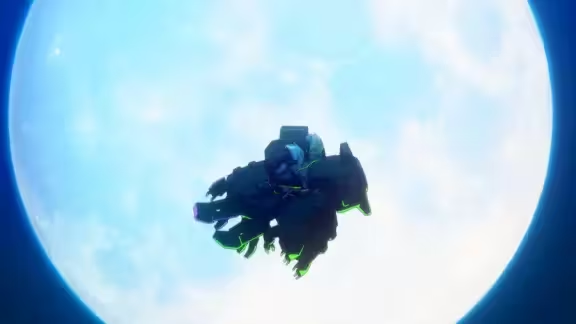
So how does Edgerunners respond to the issue of transhumanism and the loss of human agency?
Romantic love.
I’ll leave it up to the reader to decide whether that’s supposed to be a good thing or a bad thing. Personally, it isn’t as quite a satisfying answer compared to Edgerunners’ predecessors in cyberpunk anime. Maybe it wants us to consider the relation of the “other” to the “transhuman self” but I won’t go into that anymore.
It still never really addresses late capitalism properly (or at all) either. Again, fighting Arasaka wasn’t intentional. They only did it to save Lucy. Where they could have made up for it is in the aftermath of the fight but the anime ends with Lucy going to the moon to fulfill David’s wish for her (and her wish for herself initially). What feels wrong here is how she accepts David’s death and her condition in this rotten society. If David couldn’t realize this, then at least Lucy could. Even if this means going against David’s wish, it would only make it fair since David went against her wish first.
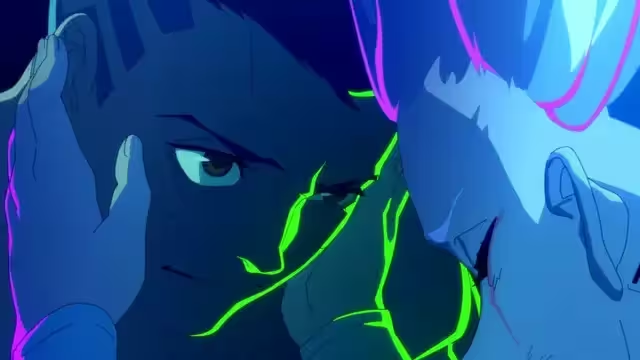
If anything, I really wish Lucy had a dream much bigger than going to the moon…
This is the front that Edgerunners, after three decades of cyberpunk anime, could not advance. Edgerunners could not push the boundaries of cyberpunk anime in responding to the issues of late capitalism which we established to be a significant part of the genre. Instead, it opted for a tearjerker ending that inspires no political or intellectual consciousness of resisting the atrocities of the dystopia at our doorstep.
That is what ruined Edgerunners for me.
But that doesn’t mean it’s the worst thing in the world. I still think it was well worth the watch. Admittedly, I teared up at the end (I’m weak when it comes to these). I’m thankful that the anime has a tragic ending at least. Most cyberpunk media are usually tragic anyway (for a good reason).
I can’t wait for the next attempt at an anime Cyberpunk spin-off. There’s still so much potential in this setting that’s waiting to be explored.